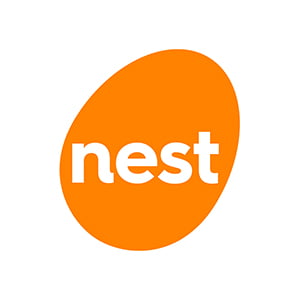
Nest Corporation
Portfolio level
Portfolio level – Portfolio decarbonisation reference target
Baseline date: 31 December 2019
Baseline performance: See below
Target year(s): 2025, 2030
Target(s):
- -30% CO2e/£mn invested by 2025
- -50% CO2e/£mn invested by 2030
GHG scopes included: Scope 1 and 2 for the 2025 target, Scope 3 to be phased in by 2025 for the 2030 target.
Asset classes in scope: Listed equity and corporate fixed income (currently c. 65% of our total AUM)
Methodology/ net zero scenarios: IEA NZE2050. This target is implemented through portfolio level sub-targets on a “fair share” basis.
For example, our developed market equity portfolio, which makes up nearly half of our total assets, has a target of -35% CO2e/$mn invested by 2025 from a 2019 baseline of 56.4 Scope 1+2 CO2e/$mn. Our investment grade credit portfolio has a self-decarbonisation target of -7% CO2e/£mn invested per annum from a 2020 baseline, as we only started investing in the asset class in 2020.
As our managers use different data providers and due to our changing asset allocation mix, we have not aggregated these into one baseline metric. We are gradually reviewing each of our portfolios to set specific reduction targets. This includes private markets which we aim to have covered by 2025.
Emissions metrics: Our developed market equity portfolio also has targets on absolute emissions reductions relative to its benchmark and we also report on absolute financed emissions on an annual basis in our TCFD report. Our target of net zero emissions by 2050 is based on absolute emissions. However, due to our projected growth in AUM we feel that an interim intensity target is more appropriate.
Portfolio level – Investment in climate solutions target
Quantitative target
Baseline: We only started investing in renewable energy infrastructure in late 2019 so have not set a baseline, as this would’ve been effectively zero.
Target year: 2030
Target: £1.4 bn
Methodology: Our current target is based on our projected allocation to renewable energy infrastructure. Please note, we have only recently added this asset class and as a result have added an absolute target, rather than a percentage increase.
We are also considering broader definitions of climate solutions and will update our target once this has been completed.
Asset level
Asset level – Portfolio coverage target
Baseline date: 31 December 2021
Baseline performance: 19.5% of developed market equity portfolio have set targets in line with well below 2C as at June 2021
Target date: 2025
Target: We are currently working with our developed market equity fund manager on setting an appropriate target. Our preferred methodology is SBTi but coverage is low and the accreditation process can take time.
Asset classes in scope: Listed equity developed markets initially to reflect the higher proportion of holdings covered by SBTi, but this will be extended to other portfolios gradually.
Data sources: SBTi
Asset level – Engagement threshold target
Target: Engaging with companies responsible for at least 70% of our financed Scope 1 + 2 emissions by 2025.
Additional information
Methodology: Our overall target is in line with the IEA NZE2050 scenario. At portfolio-level we are using a “fair share” approach of setting stricter targets for developed markets and lower targets for other markets and asset classes to build the overall goal.
Fossil fuel investment: We already exclude companies deriving more than 20% of revenues from thermal coal production or power generation, oil sands or arctic exploration of oil & gas, as well as companies investing in new developments in these sectors.
This threshold will be tightened over time to a maximum of 10% of revenues in 2023 and 0% in 2025, unless companies have committed to a full phase-out of these activities by 2030 at the latest. See Nest’s Climate Change Policy.
Operational emissions: We have set a target of reaching net zero operational scope 1 and 2 emissions by 2050 at the latest. Operational emissions are disclosed in the Nest Corporation annual reports and accounts.
Nest Corporation case studies